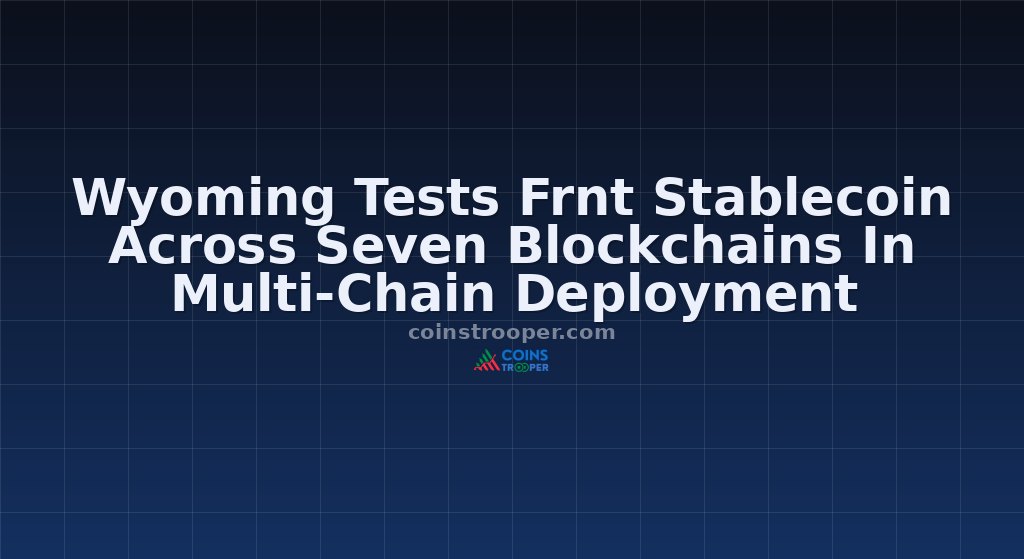Wyoming Tests Frnt Stablecoin Across Seven Blockchains In Multi-Chain Deployment

- Wyoming has deployed 100,000 FRNT stablecoins on seven major blockchains, totaling 700,000 tokens in what appears to be a testing phase.
- The deployment marks the first on-chain activity since Wyoming officially launched the Frontier Stable Token on mainnet in August.
- It is seen as the first state-issued stablecoin in the United States.
- Each blockchain received exactly 100,000 FRNT tokens.
What Happened
The deployment marks the first on-chain activity since Wyoming officially launched the Frontier Stable Token on mainnet in August. It is seen as the first state-issued stablecoin in the United States.
Each blockchain received exactly 100,000 FRNT tokens. The selection aligns with Wyoming’s stated goal of maximizing accessibility and resilience through multi-chain deployment, as outlined during the token’s August announcement.
Wyoming initially announced that FRNT would become publicly available through Kraken, a Wyoming-domiciled exchange, starting with the Solana blockchain.
Nine Wall Street banks, including Goldman Sachs, Deutsche Bank, and Citigroup, announced plans in October to develop a G7-backed stablecoin, directly challenging Tether and Circle’s market dominance.
Japanese megabanks Mitsubishi UFJ, Sumitomo Mitsui, and Mizuho are also launching yen and dollar-pegged stablecoins with plans to issue 1 trillion yen worth of tokens over three years.
Looking forward, the Wyoming Stable Token Commission has not announced a timeline for expanding FRNT beyond its current deployment addresses.
Market Context
Banks Race to Challenge Private Stablecoin Dominance
The stablecoin market has grown to approximately $309 billion as of October 2025, up 6,000% since December 2019, according to Defillama data.
Meanwhile, Citigroup has revised its stablecoin issuance forecast upward to $1.9 trillion in its base case and $4 trillion in its bull case by 2030, citing strong market growth.
“Market forces will determine the use cases,” said Joel Revill, CEO of Two Ocean Trust and commissioner of the Wyoming Stable Token Commission.
Why It Matters
“It might take some time for us to get there,” Apollo explained in a presentation earlier this year, noting that “there might be some beta testing involved and making sure we have the appropriate compliance framework in place.”
Details
Wyoming has deployed 100,000 FRNT stablecoins on seven major blockchains, totaling 700,000 tokens in what appears to be a testing phase.
According to blockchain analytics data from Dune Analytics user Marcov, the state distributed tokens across Solana, Ethereum, Arbitrum, Base, Optimism, Polygon, and Avalanche C-Chain as of October 20.
FRNT’s structure channels yield from its reserve assets directly into Wyoming’s education fund, creating what Governor Mark Gordon has called a “modern revenue stream for public services.“
Multi-Chain Infrastructure Testing Underway
“FRNT proves that governments can do more than regulate, they can innovate,” said Anthony Apollo, Executive Director of the Wyoming Stable Token Commission.
FRNT is fully backed by U.S. dollars and short-duration U.S. Treasuries held in trust, with Wyoming law mandating 2% overcollateralization to provide stability safeguards beyond typical stablecoin reserves.
The token’s architecture includes monthly financial attestations and audits conducted by The Network Firm, with reserves managed by Franklin Advisers.
Public Rollout Timeline Remains Unclear
However, regulatory hurdles have delayed public access despite the technical deployment being complete, according to reports from the commission.
Wyoming successfully piloted FRNT in July with Hashfire on Avalanche, reducing government contractor payments from 45 days to just seconds.
Wyoming’s testing phase comes as traditional financial institutions accelerate their own stablecoin initiatives amid clearer U.S. and European regulatory frameworks.
Additionally, South Korea’s financial regulator is preparing legislation for won-backed stablecoins this month, with Solana Foundation partnering with Wavebridge to build compliance-ready KRW tokens.
Monthly transparency reports and audit results are also promised to provide ongoing verification of the token’s reserve backing and operational compliance.

